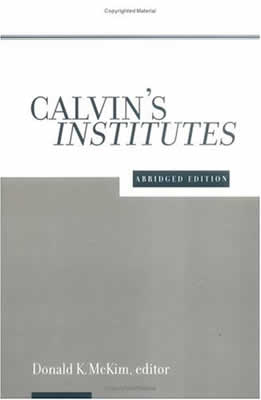GENERAL THEOLOGY Calvin's Institutes: Abridged Edition edited by Donald K. McKim (Louisville: WJKP, 2001). This is an abridgement of John Calvin’s magnum opus, The Institutes of the Christian Religion (1559), based on the Library of Christian Classics edition translated by Ford Lewis Battles (minus the critical notes and textual apparatus). In the past, there have only been four translations of the Institutes into English: Norton (1561), Allen (1813), Beveridge (1845), and Battles (1960), but it should come as no surprise that there have been more abridgements than translations, given the importance of the work and its great length. Calvin is a theologian more quoted than read, more demonized than carefully evaluated, so it is a great delight to see that Donald McKim has attempted to make this seminal work in Reformed theology more widely appreciated in a less intimidating format. This slim volume is well-suited as a basic roadmap and encouragement to further exploration, but I would prefer to reserve the words on the back cover, “a must read for students and scholars alike”, for the Institutes themselves as opposed to this condensed version. That being said, this is not an introduction to Calvin’s theology where the reader is confused by a mingling of Calvin and the author’s perspective; from the start we are exposed to Calvin’s own words in carefully chosen segments of reasonable length. Many of the more polemical sections of the Institutes are omitted due to their more historical than theological interest (sections dealing with the errors of Servetus in 2.14.4-8 and 4.16.31-32 are left out, for example) which makes grasping the general flow of the argument easier, although it also means that the reader misses out on some of Calvin’s more biting and occasionally witty rhetoric. One great advantage is that where something has been omitted from the abridgment, the reader is instantly aware of this and can chase up the missing portions if they so desire because the headings and titles of subsections are all left in even where there is no text from that section quoted. A key to the Book, Chapter, and Section numbers in the original is included in the margins throughout. The general layout of the book is most helpful, and conducive to either consecutive reading (to give the interested first-timer a quick overview of the Institutes), “dipping-in”, or even as a ready reminder for those who are already familiar with the larger work. Occasionally I found myself in disagreement with the editor’s choice of texts: I would have liked to see more on Calvin’s exposition of the Ten Commandments, and unfortunately in the superb section in Book 2 Chapters 9-11, dealing with the similarities and differences between the Old and New Testaments, we are left with only the headings (not original to Calvin). This is disappointing in view of the way that Calvin appeals in later chapters to the basic framework established here (when dealing with the sacraments for example). All the same, it would be difficult to please everyone with the choice of texts, and overall it must be said that the choices made are usually judicious. The book is perhaps a little on the expensive side, and a (far too brief) introduction by McKim could usefully have been expanded to orientate the reader more. The outstanding merit of this book, however, is that it leaves Calvin himself to do the talking and to persuade the reader that it is worth delving deeper into this enduring classic. This review was first published in Themelios 27.1 (2001). |
